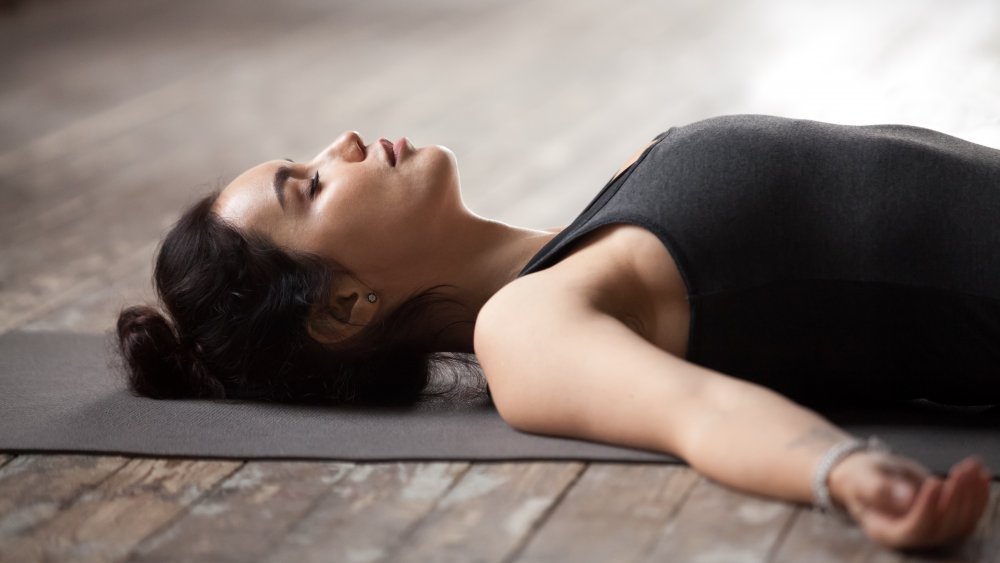The word “meditation” derives from a Latin term that means “to ponder,” according to Psychology Today. It’s not known precisely when (or even why) people began to meditate, but the general consensus among experts is that meditation has been in practice since ancient times (5,000 to 3,500 BCE). By the fourth century BCE, different cultures were beginning to develop their own versions of the practice, but all called for using the mind to observe, well, the mind — without judgment and without holding on to what we are observing. This is known as cultivating “mindfulness.”
It is often assumed that meditation must be practiced in a state of physical stillness, but meditation can also be practiced during movement, including yoga and walking, Lori Ryland, psychologist and chief clinical officer at Pinnacle Treatment Centers, explained in an interview with Health Digest. What really constitutes as “meditation” is the cultivation of mindfulness, which as it turns out is a powerful tool that virtually anyone can use to support their health, both physical and mental.
Meditation can help you cope with anxiety

Research has shown that meditation can help alleviate anxiety. However, observing our thoughts may not always be pleasant, psychologist Lori Ryland told Health Digest, particularly since our thoughts are often the source of our own anxiety. In fact, the very act of meditating may even create feelings of frustration and stress. However, as we watch our thoughts give way to feelings of frustration and stress, we are inevitably confronted with the knowledge that there is an actual difference between our “self” and our “thoughts.”
In other words, we come to understand that who we are is separate from what we think. We also come to understand that thoughts are fleeting; they come and go. The experience of consciously observing our own thoughts teaches us that our thoughts have no inherent power over us. We can even go so far as to let them go, psychotherapist Lisa Hutchison told Health Digest. As we practice meditation, we learn to recognize which thoughts are creating anxiety (e.g., worrying about what isn’t within our control), and we can shift our focus and attention on thoughts that are less anxiety-provoking.
Meditation can help ease depression

“Many people with depression or anxiety turn to … nonconventional interventions, including yoga [and] meditation,” a trio of scientists out of East Carolina University Brody School of Medicine, Greenville, North Carolina pointed out in a 2024 article published in the academic journal American Family Physician. Yes, meditation can help ease the symptoms of depression — perhaps even more so than anxiety — the scientists pointed out, and those positive effects have been demonstrated to last for six months or more and are associated with no apparent side-effects.
Health Digest asked certified meditation instructor Paul Harrison how it is that meditation can help ease the emotional pain of depression. When we practice meditation, he explained, we are learning that we may have negative emotions, but we can observe and acknowledge them without reacting. What this does is help to reduce the power those thoughts and feelings may have to cause us discomfort.
A regular meditation practice can help with OCD

Shutterstock
People with Obsessive-Compulsive Disorder (OCD) experience recurrent thoughts that are unpleasant and intrusive that are sometimes accompanied by a compulsion to engage in repetitive behaviors designed to alleviate the obsessive thoughts, according to a 2024 study.
It’s estimated that about 25 percent of American adults experience some degree of OCD. Medication and behavioral therapy help some, but not all, people dealing with OCD, so it may be comforting to know that meditation has been proven effective in countering obsessive thoughts, yoga and meditation instructor Daniela Mattos told Health Digest.
The 2024 study referred to above, which was published in Frontiers in Psychology, is the third clinical trial and the second randomized controlled trial to demonstrate that a regular meditation practice can provide satisfactory relief for people for whom pharmaceutical and therapeutic intervention have proven unsatisfactory. The benefit appears to be in observing thoughts without immediate reaction. In fact, the study authors go so far as to suggest some clinicians consider adding it as a protocol in the first instance, in order to amplify the effects of medication and/or therapy.
Meditating regularly can help you learn to focus better

Shutterstock
Meditation can help us to learn to focus even when we are faced with multiple distractions. When we meditate, we practice observing what we are thinking in the present moment, and without judgment or any reaction whatsoever. Even if observing those thoughts takes us momentarily outside of the present moment, meditation teaches us to simply observe where our mind has gone and return to the present moment. You can therefore see how when we practice meditation, we are (whether we realize it or not) practicing the art of focusing amid life’s many distractions, psychotherapist Lisa Hutchison told Health Digest.
“In our modern society, we have multiple computer screens open. We try to focus, but we keep getting distracted by this, that, and the other,” Hutchison explained. “When you practice meditation, you practice selecting the thoughts to focus on, and which thoughts should just be allowed to fade into the background.”
Meditation benefits your immune system

Shutterstock
In 2024, the Annals of the New York Academy of Sciences published the results of the first comprehensive review of randomized controlled trials that examine the effects of meditation on the immune system. The results suggest that practicing meditation can have positive effects on the body’s disease-, aging-, and inflammation-fighting mechanisms. More research is needed, of course, but this shows promise, according to the study authors. And Valerie Knopik, the director of research for Yoga Medicine, told Health Digest that she is optimistic that the results will be replicated.
Another factor that makes meditation helpful in supporting the immune system may be how it affects the good bacteria in our gut. “Our gut microbiota plays an important role in our immune response,” Knopik explained. “When we are under stress, our bodies respond with a fight-or-flight response that causes a cascade of events, including a release of hormones that are known to disrupt the gut microbiota.”
A 2024 study published in Advances in Mind Body Medicine demonstrates that meditation may directly interfere with the release hormones or their effect on the microbiome, with the end result being improved immune function.
Meditation may help you fight or avoid some respiratory infections

Shutterstock
The results of a 2024 study published in the Annals of Family Medicine bode well for meditation’s potential to help improve the outcome of certain infections. In that study, 149 adults over the age of 50 were randomized into one of three groups. One group was given eight weeks of training in meditation, one was given eight weeks of moderate-intensity sustained exercise, and one was the control group who were simply observed, along with the other two groups, over the course of the cold and flu season.
The researchers found that the meditation and exercise groups had fewer acute respiratory infections than the control group. Additionally, those in the meditation group experience shorter “illness duration.” And since COVID-19 causes, among other things, acute respiratory symptoms, this study supports that there may be some value in meditating as a preventative, psychologist and chief clinical officer at Pinnacle Treatment Centers, Lori Ryland, told Health Digest. Of course, meditation is not a cure-all for the coronavirus. However, it’s a healthy practice that you may find worth adding to your routine.
Practicing meditation can help you to cope better with physical pain

Shutterstock
Meditation can help us to better cope with physical pain, chiropractor Alex Trauberg told Health Digest. That’s because cultivating mindfulness teaches us to separate our thoughts from what we might be feeling, whether emotionally or physically. “Learning to be mindful helps you look at what’s going on inside you as if you were observing it from outside, which can help you to transform how you perceive physical stimuli.” The way it works, Dr. Trauberg explained, is by putting mental distance between yourself and the uncomfortable feelings.
“Most people try to ignore their pain,” noted Dr. Trauberg. “This is the opposite approach.” Instead of ignoring your pain, you focus on it. Trauberg’s findings are supported by a 2024 article published in the academic journal Neuroscience Letters, which reviewed the brain mechanisms involved in meditation-related pain relief and theorized that meditation-related pain relief may share a common neural pathway with other effective cognitive pain-modulation techniques.
When you meditate regularly, you may start to sleep better

Shutterstock
“Insomnia is one of the most prevalent health concerns in the population and clinical practice,” according to a 2024 study published in the academic journal, Complementary Therapies in Clinical Practice. But one of the benefits of meditation is helping support better sleep, the study highlighted. The practice of meditation helps to focus the mind on the present moment and increase awareness of one’s external surroundings and inner sensations, Valerie Knopik, the director of research for Yoga Medicine, explained to Health Digest. Doing so can help banish ruminating thoughts and emotional reactivity that can contribute to difficulty falling asleep and staying asleep.
In addition, meditation can help increase the amount of naturally occurring melatonin circulating in the body, and melatonin supports both falling asleep and enjoying a more restful sleep, according to the Florida Medical Clinic. Moreover, meditation helps alleviate the symptoms of some mental health disorders. This, too, can promote sleep considering insomnia is often a symptom of conditions like anxiety and depression.
Meditation can help you recover from your workouts faster

Shutterstock
One particularly interesting way that meditation can benefit your health is that it can help you better recover from working out. “Deep, slow breathing has been shown to help calm the parasympathetic nervous system,” certified personal trainer and meditation instructor Patrick Henigan told Health Digest. “The parasympathetic nervous system governs your response to stress, including activating your fight or flight reaction.” Working out is a form of stress, albeit a physical one and one that we impose upon ourselves intentionally and with the purpose of building strength and stamina.
Nevertheless, physical stress is stress, and your body responds to it the same way it responds to other forms of stress, including releasing the hormone cortisol into the blood. Elevated cortisol levels can inhibit muscle growth and even encourage the body to store fat. By practicing meditation, especially immediately after a workout session, you may be able to help calm the parasympathetic nervous system, thus reducing the amount of cortisol released in the blood. In addition, meditation helps support better sleep, which Henigan told Health Digest helps support better muscle recovery.
Meditation may improve your athletic performance

Shutterstock
“Meditation can do a lot to help athletes achieve peak performance levels,” meditation instructor Paul Harrison told Health Digest. This is, in part, because meditation can reduce cortisol levels and thus make post-workout recovery more effective. Plus, meditation can support a better night’s sleep. But the reasons also go beyond the physical. The practice of meditation helps with mental focus, and it helps us let go of counterproductive thoughts. That is why many professional athletes keep a regular meditation practice in their toolkit.
For example, Golden State Warriors basketball player Klay Thompson told AP News that his meditation practice helps him to cope with the pressures that go along with an NBA career, and to play a more focused game (via USA Today). Earlier in his career, Thompson sometimes had trouble letting go of a game even after the final buzzer, and that could undercut his performance in the next game. Meditation has learned to help him stay in the moment, which allows him to shrug off, say, a poor shooting performance, and then get back to work.
Meditating regularly can help you cultivate a better body image

Shutterstock
A regular meditation practice may benefit your life by improving your self-esteem. There are a number of different theories as to why this may be. Certified personal trainer and meditation instructor Patrick Henigan told Health Digest that the act of spending quiet time observing our thoughts without judgment gives us a much-needed opportunity to connect with and appreciate ourselves.
Ahmad Mickens, founder and head boxing and personal training coach at Revolution Training in Stamford, Connecticut, previously told Health Digest that committing to any daily healthy practice can do amazing things for one’s self-esteem, and those results can spread throughout all aspects of your life.
Lori Ryland, psychologist and chief clinical officer at Pinnacle Treatment Centers, pointed out to Health Digest that the mere act of spending time consciously observing our thoughts makes us aware that we are separate from our thoughts, which goes a long way toward helping to separate ourselves from whatever it is we “think” we should be. Our self-esteem often suffers because we are not enough of whatever it is we think we should be, but meditation can help free us to see ourselves in a different, kinder light.
If you practice meditating regularly, you may notice a change to your appearance

Shutterstock
Meditation may not only help you to feel better about yourself, but actually make you look better, according to certified meditation instructor Paul Harrison. Pointing out that many famous models and celebs maintain a regular meditation practice, Harrison explained to Health Digest that this may come down to regulating cortisol levels.
Meditation is known to help decrease the amount of cortisol (aka stress hormone) circulating through our bodies. Higher cortisol levels not only cause us to experience unhealthy food cravings, they also inhibit the growth of hair and skin cells. That’s one reason why when we feel stressed, we may experience hair loss and acne. Meditation, on the other hand, has been known to combat stress and reduce cortisol levels. In addition to counteracting stress, meditation can also counteract the cosmetic effects of stress on our bodies.
Meditation could help slow down the aging process

Shutterstock
Meditation seems to have positive effects on the body’s disease-, aging-, and inflammation-fighting mechanisms, as a 2024 study published in the Annals of the New York Academy of Sciences explained. While the results are preliminary, they show promise, according to Valerie Knopik, the director of research for Yoga Medicine. The notion that meditation can slow the aging process is also championed by physician Dilraj Kalsi.
Aging has been linked to the condition of our telomeres. Telomeres are located at the end of your DNA and act like the plastic bit on your shoelaces, which is to say they keep the ends of the DNA from fraying or sticking to one another. “There is now evidence suggesting that meditation can help to maintain the telomeres for longer, with potential benefits in terms of aging,” Dr. Kalsi told Health Digest. Kalsi’s professional opinion is further supported by a 2024 study published in the academic journal Current Opinions in Psychology.
Meditation can help you fight addiction

Shutterstock
Although scientists have been investigating meditation as a treatment for affective disorders such as depression, anxiety, and OCD for several decades, the study of meditation as a treatment for addiction is still very much in its infancy. However, great strides have been made in the last decade. As Dr. Brian Wind, psychologist and chief clinical officer of JourneyPure addiction treatment center, told Health Digest, a 2024 study demonstrated that meditation can help prevent relapses in people who are in recovery from substance use disorder.
The reason, Dr. Wind explained to us, is that when someone in treatment for addiction practices meditation, they are practicing observing and acknowledging their desire for their substance of choice. But while meditation shines a spotlight on those desires, it also trains the person to face down their cravings without reacting. Dr. Wind also noted that on a physiological level, meditation can alter brain receptors that have been linked with substance abuse and addiction.




